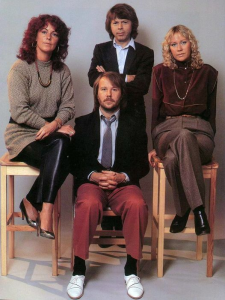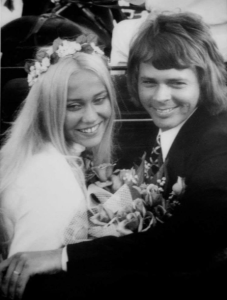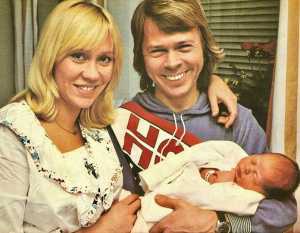Agnetha Fältskog

Early Life and Musical Beginnings: Agnetha Åse Fältskog was born on April 5, 1950, in Jönköping, Sweden. She grew up in a musical family and developed an interest in singing at an early age. Agnetha’s talent for music was evident as she started performing in local choirs and bands during her teenage years. By 1967, she had released her first single, “I Was So In Love,” which became a hit in Sweden. Her debut album, Agnetha Fältskog, followed soon after in 1968, marking the beginning of her solo career. ### Joining ABBA: In 1972, Agnetha’s life took a major turn when she met Björn Ulvaeus, a member of the Swedish group Hep Stars. Agnetha and Björn began a relationship, and soon after, she became involved in his musical projects. Alongside Benny Andersson and Anni-Frid Lyngstad, they formed the iconic pop group ABBA in 1972.

The band’s name was created from the first letters of their first names: **A**gnetha, **B**jörn, **B**enny, and **A**nni-Frid. ABBA’s rise to international fame began in 1974 when they won the Eurovision Song Contest with the song “Waterloo.” The victory helped them break into the global market, and they quickly became one of the biggest pop groups of the 1970s and early 1980s. Agnetha’s vocal prowess, often paired with Anni-Frid’s harmonies, played a significant role in the band’s distinctive sound. Hits like “Dancing Queen,” “Mamma Mia,” “Take a Chance on Me,” and “Fernando” made them household names, and ABBA became known for their catchy tunes, dazzling costumes, and unforgettable performances. ### Personal Life and ABBA’s Breakup: While ABBA enjoyed massive success, behind the scenes, Agnetha’s personal life was facing challenges. She and Björn Ulvaeus went through a difficult divorce in 1980, which added to the emotional weight of the band’s disbandment in the early 1980s.
The exact reasons for ABBA’s breakup are often debated, but the personal struggles of the members, combined with the pressures of their career, led to the group deciding to take a break. ### Solo Career: After ABBA’s disbandment, Agnetha took a brief hiatus from the music industry to focus on her personal life, but she eventually returned with a solo career. Her first solo album after ABBA, Wrap Your Arms Around Me (1983), was released in English and received positive reviews. The album featured hits like “The Heat Is On” and “Can’t Shake Loose,” and Agnetha continued to enjoy success with her solo work in the 1980s. However, Agnetha chose to maintain a relatively low public profile during the 1990s and early 2000s. Despite the lack of media presence, her fan base remained loyal, and she continued to make occasional public appearances, particularly in Sweden. ### Return to the Spotlight: In 2004, after years of relative seclusion, Agnetha made headlines by releasing the album My Colouring Book, which was a collection of classic pop songs from the 1960s. The album was a success in Sweden and other countries, and it was seen as her first major project in years. She followed up with another album, A, in 2013, which showed a more contemporary sound while still retaining the emotional depth and musical style that had defined her early career.

Agnetha’s return to music was met with a warm reception from both fans and critics, and she became more open to the media. She participated in interviews and appeared in documentaries about ABBA’s legacy, helping to remind a new generation of fans about the group’s cultural impact. ### Legacy: Today, Agnetha Fältskog is regarded as one of pop music’s most iconic voices, and her role in ABBA’s success has solidified her place in music history. ABBA’s music continues to enjoy global popularity, with songs featured in movies, stage productions, and countless covers by other artists. Agnetha’s voice remains one of the defining elements of the band’s signature sound, which still resonates with listeners around the world. Despite her quieter lifestyle after ABBA, Agnetha’s influence on pop music is undeniable. Her work with ABBA helped to redefine the pop genre, and her solo albums continue to receive acclaim. Agnetha Fältskog’s story is one of talent, resilience, and lasting impact in the music industry. Would you like to know more details on any specific part of Agnetha’s journey?

Agnetha Fältskog is a Swedish singer, songwriter, and one of the most iconic figures in pop music, best known as a member of the legendary group ABBA. Her life and career have been marked by incredible success, personal struggles, and notable moments of reflection. Here’s a more comprehensive look at her background, career, personal life, and legacy. ### *Early Life and Career Beginnings* – *Full Name*: Agnetha Åse Fältskog – *Born*: April 5, 1950, in Jönköping, Sweden. – *Family Background*: Agnetha was raised in a musical family. Her father, Knut, was an actor and her mother, Birgit, was a singer. Music was a constant presence in her home, which helped foster her early interest in it. – *Early Music Career*: Agnetha’s music career began when she was just a teenager. In 1967, at the age of 17, she signed a record deal and released her first single, “Jag var så kär” (“I Was So in Love”), which became a hit in Sweden. This success helped her to gain more recognition and eventually led to the release of her first solo album in 1968.

*Joining ABBA* – *Formation of ABBA*: In 1972, Agnetha’s career took a significant turn when she became part of ABBA, one of the most successful and influential pop groups in history. The group also consisted of her then-husband Björn Ulvaeus, Benny Andersson, and Anni-Frid Lyngstad (Frida). The name “ABBA” comes from the initials of the band members. – *Breakthrough Success*: ABBA’s first international hit was “Waterloo,” which won the Eurovision Song Contest in 1974. This victory launched the group into international superstardom. From there, ABBA went on to release a string of chart-topping albums and singles, including “Dancing Queen,” “Mamma Mia,” “Fernando,” and “Take a Chance on Me.” – *Agnetha’s Role in ABBA*: Agnetha was known for her strong, emotive voice, which became one of the defining features of ABBA’s sound. She was often the lead vocalist on many of the group’s biggest hits, including “Dancing Queen,” “SOS,” and “The Winner Takes It All.” Her unique vocal style, which ranged from sweet and innocent to powerful and passionate, helped cement ABBA’s place in pop history.


### *Personal Life and Challenges* – *Marriage to Björn Ulvaeus*: Agnetha married her ABBA bandmate Björn Ulvaeus in 1971, and they had two children together: a daughter named Linda (born 1973) and a son named Christian (born 1977). Their relationship, while public and full of love at the start, eventually fell apart in 1979. They separated, and their divorce was finalized in 1981. Despite the breakup, the two remained close and professional, continuing to work together in ABBA. – *Struggles with Fame*: The intense fame and constant media attention took a toll on Agnetha. She became known for her somewhat reclusive nature, retreating from public life after ABBA’s heyday in the early 1980s. Agnetha later revealed that she struggled with depression during this time, feeling overwhelmed by the pressures of fame and the emotional toll of her personal life. – *Seclusion and Family*: After ABBA disbanded, Agnetha focused on raising her children, particularly enjoying time at her home in Sweden. She distanced herself from the public eye, choosing to focus on her personal life. However, she occasionally returned to music, releasing several solo albums over the years.
*Solo Career* – *Post-ABBA Solo Work*: After ABBA’s disbandment in 1982, Agnetha pursued a solo career, releasing albums that reflected her personal style and musical evolution. Some of her more well-known solo albums include: – Wrap Your Arms Around Me (1983): This album achieved commercial success, especially in Sweden and parts of Europe, with hits like “The Heat Is On” and “Can’t Shake Loose.” – Eyes of a Woman (1985): Another successful album in Sweden, though it did not have the same international impact as her ABBA years. – I Stand Alone (2004): This album marked Agnetha’s return to music after a long hiatus and was praised for its mature sound and reflective themes. It was released to positive reviews but did not achieve the commercial success of her ABBA days. – *Musical Style*: Agnetha’s solo work spanned different musical genres, including pop, soft rock, and adult contemporary music. Her voice remained a defining feature of her sound, combining vulnerability with power.
*Return to the Spotlight and ABBA Reunion* – *2013 Comeback – *A**: After years of staying out of the limelight, Agnetha made a major comeback in 2013 with the release of her album A. The album was well-received, marking her return to the public eye as a solo artist. Tracks like “When You Really Loved Someone” showed her ability to still produce music with deep emotional resonance. – *ABBA Reunion – *Voyage (2021)**: In 2021, Agnetha, along with the other ABBA members, reunited to release Voyage, their first album of new material in 40 years. The album received widespread acclaim and included songs like “I Still Have Faith in You” and “Don’t Shut Me Down.” ABBA also announced a virtual concert series, with digital avatars of the band performing the music live. ### *Personal Life in Recent Years* – *Private Life*: In recent years, Agnetha has continued to maintain a relatively low public profile, preferring the quieter, private life she had sought earlier. She enjoys her time in Sweden, staying away from the constant media attention that defined much of her earlier career. – *Family*: Agnetha remains close to her children, who have grown up and formed their own lives. She has also been open about the importance of her family and the peaceful, fulfilling nature of her personal life now. ### *Legacy and Impact* – *ABBA’s Influence*: Agnetha Fältskog is recognized as one of the most influential female voices in pop music. Alongside her bandmates, she helped shape the sound of the 1970s and early 1980s with ABBA’s infectious pop melodies and harmonies. ABBA’s music continues to influence artists and has an enduring place in popular culture. – *Iconic Voice*: Agnetha’s voice is a hallmark of ABBA’s sound, characterized by its clarity, emotional depth, and ability to deliver both joyful and heartbreaking performances. Her work with ABBA, along with her solo efforts, has ensured that she remains a beloved figure in the music world. – *Cultural Icon*: Agnetha Fältskog’s influence extends beyond music. She became an international icon, admired not only for her musical talents but for her beauty, poise, and style. Even decades after ABBA’s breakup, she continues to be revered by fans around the world.

### *Summary* Agnetha Fältskog’s life has been a blend of incredible musical achievements, personal growth, and introspection. From her rise to fame with ABBA to her solo endeavors, she’s made an indelible mark on the music world. Despite facing personal challenges and choosing a more private life in recent years, Agnetha remains a beloved figure whose legacy continues to inspire new generations of fans.












